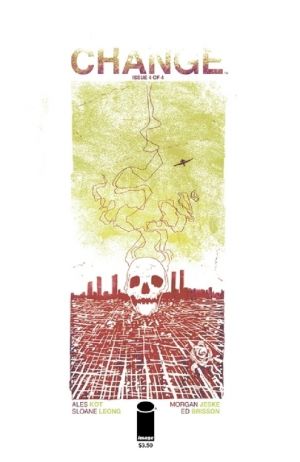Comics /
Comic Reviews /
More Comics
Change #4 Review
By Zak Edwards
March 17, 2013 - 21:36
I’m currently listening, somewhat loudly, to M.I.A’s woefully misunderstood album Maya, which, I think, is probably best understood as an auditory meditation on the contemporary human experience. Maya, I think contrary to what its composer somewhat haphazardly attempted to articulate through fairly inane, pseudo-political acts, is a soundscape for what we experience online. It assaults at times, becomes nearly intelligible, and holds within it nuggets of genius and careful meditation on what exactly it means to be a person growing up with multiple virtual outlets and connections that exists in a primarily consumer mentality. A lot of reviewers couldn’t wrap their heads around the disparaging motifs as a concept album and, hence, the ‘woefully misunderstood.’
 |
Ales Kot’s Change is exactly this. At once performance philosophy, a visual cluster, an assault, and a disparaging amount of stories that form a whole, but one that is not exactly cohesive or designed to be. Many of the comics that operate like this have a coming together at the end, a sort of “Aha!” moment that clears it all up for some sweet closure. This final issue of Change does this to a certain extent, Kot somewhat sarcastically refers to a “Blofeldian Moment” (the moment when the James Bond supervillain monologues his grand master plan), and there is definite sense of an ending, but it feels unresolved. The book works along differing lines that congeal and come apart, stays focused and gazes into entirely different directions.
The sentient tumour, Kot wearing his Grant Morrison influence on his sleeve in the best ways possible, is probably the best example of what I’m trying to say. The characters are looking opposite directions and their identities are constantly switching. They literally see things differently based solely on perspective, but their presence taps into the anxieties of the comic in general. The host’s identity is taken, brought back, but always divided. The screenwriter has similar problems with the tampering of her work, so desiring to have her authentic voice captured, heard, and, most importantly, validated. The rapper, unable to articulate himself, is similarly unable to move beyond his identification with a hero’s quest, and thus continually asks questions that either can’t be answered or are completely missing the point. Finally, we have that amazing moment when the drone “remembers everything” and exclaims “I am alive! Whee!” before its destruction. While I am unsure what the drone’s role is particularly, I think the fact it becomes sentient by remembering is a striking image. But, when the man, now free of his tumour, emerges from the spaceship/apocalypse/Old One (with a glorious “PFHOORT”), his identity is still split. But after a rebirth and sexual encounter with his past, they now share the same field of vision and he can begin to live with a shifting identity. The book seems to bleed memories, dreams, and identities of characters throughout.
I’m not sure if this makes entire sense. I hope at some point, when I have more time to sit down with a four issues, I can write a longer piece on this truly incredible series. But, as it stands, I’m just going to conclude with:
9/10 Dense, dynamic, and actually innovative. Ales Kot is the writer to watch in 2013.
Last Updated: January 17, 2025 - 08:20
